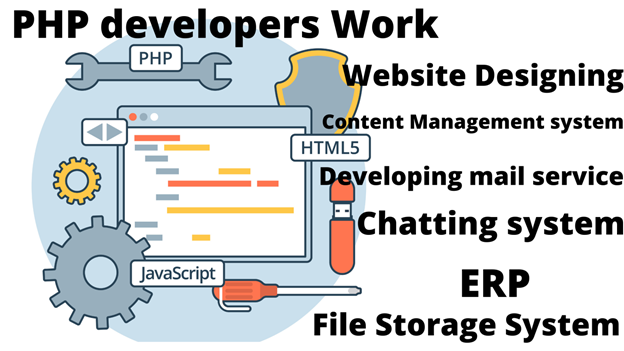PHP WEB DEVELOPMENT
PHP is a programming language that is mostly used for web development. Developers choose to utilize this scripting language for developing the server side of web applications, even though it was originally designed to produce dynamic websites. However, PHP was designed to be a general-purpose language, it may have alternative versions if they are required. PHP may also be used to create desktop apps. PHP is object-oriented programming that provides a completely new set of possibilities.

It is regarded as a very effective technology that facilitates the development process by providing several additional tools. PHP is the world’s fifth most used programming language, according to the Popularity of Programming Language Index (PYPL).
This scripting language’s flexibility stems from its great ability to integrate with other computer languages. Developers, for example, may build additions to PHP in C, allowing them to add even more capability. Furthermore, PHP has a huge variety of frameworks and libraries available that enhance its abilities even further. The most well-known instances of such frameworks are Laravel, Symfony, Phalcon, Zend Framework, and Yii.
Some of the most well-known examples of PHP-based software are Facebook, Wikipedia, Flipkart and most familiar content management software called WordPress. There are a vast number of built-in and third-party plugins that make WordPress suitable for nearly any situation – thanks to WP, it may be used to construct a blog, a picture gallery, an online store, a news portal, and many other sorts of websites.

Facebook is another illustration of what PHP is capable of. PHP code is still intimately connected to other web technologies in this social network, even though it has developed into a sophisticated environment with a wide range of services including instant messaging (IM), advertising (AdSense), blogging (Blogging), news presentation (News), video play
As an illustration of what PHP can achieve, consider Wikipedia, the world’s largest online library.
As the largest online retailer in India, Flipkart relies heavily on PHP. Flipkart is a good illustration of how PHP has evolved. Ecommerce website design and development in a dynamic approach
Why people go with PHP?
Numerous advantages of PHP have made it a powerful and effective programming tool, which is why it is so popular. There are several reasons why PHP is a fantastic choice for your web project, which will be explained in greater detail in the following sections.
The following are nine reasons to use PHP:
Taking a closer look at the PHP perks stated above, let’s find out how they may be used in practice to increase the quality and functionality of your web project and its profitability.
There are a large number of PHP developers, some of whom may be suitable prospects for employment, as a result of PHP’ As a result of the huge number of available professionals, there is a high level of competitiveness and lower salaries sought, which Apart from that, this language is very straightforward to learn and apply, thus even young developers are generally able to successfully build the fundamental functions of an app.
As a result of the availability of many tutorials, manuals and other reference materials, it is easier to create, and they may serve as a source of To make the learning process simpler, these resources steadily increase in complexity. Aside from being very easy to pick up and use, learning PHP is also more popular than other programming languages.
The usage of PHP speeds up the loading of web pages compared to other technologies. To give you an example, PHP is now roughly three times quicker than Python in the vast majority of A website’s faster loading time, on the other hand, is an essential SEO ranking feature that promotes a website’s promotion by When combined with additional benefits, a better application speed keeps consumers happy and contributes to building and maintaining a client base.
In PHP, you may connect to virtually any database. MySQL tends to be the most popular choice among developers since it is free, effective, As like MySQL, MS-SQL, SQLite, and PostgreSQL, there are a number of other excellent alternatives for database available – Elasticsearch, Redis, MongoDB, and other non-relational databases may all be utilized with PHP. They are not restricted to a single database and may choose the best one for a future project, taking into account all important aspects.
PHP is a free-to-use technology that may save you a lot of money on your Deployment costs are further reduced because the bulk of PHP development tools are open-source and free to use. To make the development process easier and more efficient, PHP may be extended with a variety of frameworks like Laravel or CodeIgniter or CMS like WordPress or Drupal.
The LAMP stack is the most typical operation model for a PHP website. If a website runs on an Apache HTTP web server running on a Linux machine and utilizes MySQL as a database, then it’s running There are no costs associated with any of these components, and the stack is well-tested, reducing the amount of time and money necessary for development
There is a lot of synergy between PHP and HTML since PHP allows you to incorporate HTML code. However, PHP scripts do not interfere with HTML code on a web page, but rather finish it within <php> tags. You may also use a script to incorporate HTML code into a PHP-based website. Unlike a conventional HTML page, the PHP tags would come first, followed by the HTML tags.
PHP’s flexibility allows it to work well with a variety of different programming languages, allowing the software product to take use of the most appropriate technology for As a cross-platform language, PHP allows developers to code on Windows, Linux, and macOS systems without having to switch to another operating system to do so. As a result of this flexibility, the development process is sped up and costs.
There are several applications for cloud computing systems, such as Amazon Web Services, which are used by many current goods It is possible to run PHP-based applications on cloud services such as AWS Lambda.

MISTAKES TO AVOID – WHILE CHOOSING PHP
In spite of the fact that PHP is unquestionably beneficial for web development, it has some drawbacks that prevent it from dominating this as part of a fair assessment, let’s look at these flaws and see how they may affect the future product and its business implementation.
Top 3 disadvantages of PHP:
There are easier programming languages for web projects than PHP, despite the fact that it is a strong tool with a big community and The reason for this is that most newbie developers choose to study Python as their first language and seldom contemplate adding PHP to their tool At the moment, PHP is king of the hill when it comes to web programming, but this is going to So, PHP-based goods are likely to become more expensive as PHP professionals become scarcer and there is a shortage of beginner developers who can provide fundamental abilities at a reasonable price.
It’s no secret that machine learning, for example, is a big topic right now, and it’s just going to get When it comes to creating online apps that are powered by machine learning and machine learning frameworks, PHP cannot compete with Python. TensorFlow, Scikit-learn, Theano, and Keras are all Python libraries that may be used with PHP. That’s why it’s a bad idea to use PHP if your software relies on machine learning (ML) or may need it in the future.
Because of a variety of factors, worries about the security of PHP-based products have persisted throughout time. There are several reasons for this, including PHP’s open-source nature, which means that once a vulnerability has been discovered, it becomes common knowledge Theoretically, any programmer with evil intent and the necessary skills might exploit these vulnerabilities between the time they were discovered and the time they were fixed in the latest versions of the programming language. To be fair to other open-source technologies in general, this disadvantage may be attributed to the open-source approach rather than the PHP language in particular.
In addition to the low entrance barrier for inexperienced programmers, PHP has a terrible reputation when it comes to its security. Many websites and applications are created by unskilled developers, trainees, or even amateurs as a result of this situation PHP has a terrible reputation for security and performance because of the outcomes of their labor, which add to the myths and facts There is no need to be concerned about the security of your product if you work with a development business with a solid reputation and a team of knowledgeable and qualified professionals.
GROWTH GRAPH – Past? Now? Future?
Right now, PHP is still king of the hill when it comes to web development. This computer language powers many websites, and the easy-to-use content management system WordPress continues to gain popularity. Using only a few mouse clicks, anyone may create and publish their own websites on free or commercial hosting platforms. Since a result, the PHP language’s immediate future is positive, as it will continue to grow and be widely utilized.
In spite of this, PHP’s long-term sustainability in web development raises certain worries. This trend is not expected to alter very soon, as Python already draws more fresh developers than PHP.
It’s also worth noting that Python is superior than PHP when it comes to a few highly needed capabilities, including machine learning, thanks to PHP’s popularity will continue to decline if it does not make a big jump in its evolution to catch up with Python.

On which role does the PHP programmer work?
It is common for PHP developers to adhere to a method known as the Software Development Life Cycle (SDLC), which consists of six stages: Analysis/Design/Development/Testing/Implementation. As a result, they deal with computers daily and are typically employed as part of big software development teams at large corporations, digital agencies, or contract-based like those of other Software Developers.
Responsibilities of a PHP developer
For any assistance, please visit www.sherjitech.com